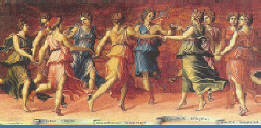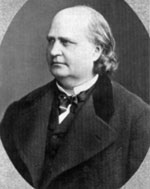|
|
Leconte de Lisle was born in Réunion, son of a former army surgeon, but was educated in
Rennes. He returned to Réunion in 1832 but moved once more to mainland France in 1837
in order to study law in Paris. After completion of his studies, he returned briefly to
Réunion but left the island for the last time in 1845.
He became an advocate against slavery and adopted republican politics with which he soon
became disenchanted. He sank into poverty and scraped a living as a tutor but, encouraged
by Baudelaire, he published Poèmes Antiques in 1852, which confirmed his place in
literary circles. He also became assistant librarian at the Palais de Luxembourg in that
year. The publication was followed by Poèmes et poésies in 1854, Le Chemin de la croix
in 1859 and Poèmes barbares in 1862 amongst other works.
He was awarded a prize by l'Académie Francaise in 1856 followed by another in 1857 shortly
after his marriage to Anne Adélaide Perray.
He became a highly regarded literary figure numbering Hérédia, Villiers de l'Ile-Adam,
Léon Dierx, Sully Prudhomme et Mallarmé amongst his admirers and formed a close
association with Victor Hugo in 1874 after having translated the Illiad and the Odyssey
in the 1860s as well as many other Greek classics. He became Officer of the Légion
d'Honneur in 1883 and was awarded a further prize from l'Académie Française in 1884
for his Poèmes Tragiques. He was elected to the chair of the Academie vacated upon
the death of Hugo in 1886.
He died suddenly in Voisins, near Louveciennes, departement Yvelines.
His poetry was in a clear, rhythmic style of classical proportions, observational of,
rather than participatory in, the affairs of mankind. He is considered to be a leading
representative of Parnassianism which was influenced by the emotional detachment of the
Greek myths. Parnassianism sought more strictly to contain the extravagances of the
romantic era and formed a bridge to the later symbolist poets. Some of his poems have
been set to music by the great composers of the late 19th and early 20th centuries.
|

